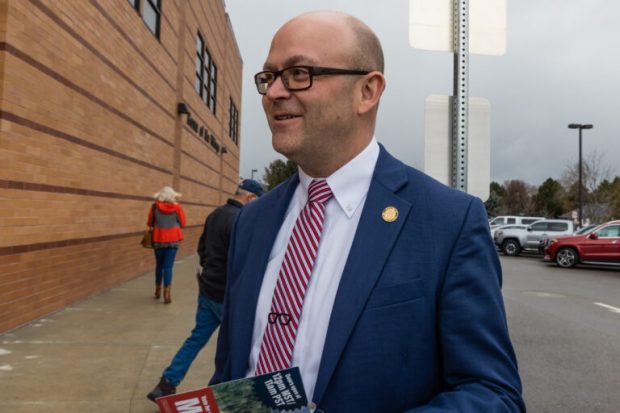Candidates to Idaho’s Legislature have raised $6.2 million as of Sept. 23, up from what they had raised at the end of March at $3.8 million.
All of that money funding the campaigns of Idaho’s future lawmakers can be traced back through the Idaho Secretary of State’s campaign finance portal – an important tool used for transparency.
Campaign finance refers to how candidates get money for their campaigns, and how they spend it. The amount of money a candidate raises is not an indicator of whether a candidate will win the election, but it can show how widespread support is for a candidate, Idaho Secretary of State Phil McGrane told the Sun.
“It’s important for people to know who is influencing people’s votes,” McGrane said.
In a state where agriculture and education are the priority of many candidates, transparency in campaign finance helps voters understand what interests may influence a candidate’s stance on issues such as pesticide regulations and school vouchers, for example.
Navigating campaign finance can be complex, but it is all public information – and anyone with internet access can see where the money comes from and what interests are influencing Idaho’s candidates.
Where can I see how much a candidate has raised?
Step 1: Go to VoteIdaho.gov.
VoteIdaho.gov is a state-funded website run by the Idaho Secretary of State. It is the official website for anything election-related in Idaho. It includes information about where and how to vote, past election results, data on voter turnout and demographics and campaign finance.
Step 2: Under the “Running for Office” tab at the top of the page, there is an option for “Campaign Finance Portal.” By clicking this button, the site will take you to Sunshine, Idaho’s campaign finance database.
Step 3: On the left side of the page under “Candidate Information,” type in the name of the candidate you’re interested in. Once there, click on the candidate’s name to see a detailed dashboard of information about their campaign finances. This information is regularly updated as candidates file their monthly reports.
A brief overview of campaign finance laws
Campaign spending has always played a role in elections. In 1758, George Washington won a local election after spending money on alcohol to win over voters.
Today, campaign finance laws are much stricter, and there are tools voters can use to track down how candidates raise and spend their campaign funds.
Idaho’s campaign finance laws were established through a citizen initiative in 1974, as a part of a national push for more transparency in campaign spending, McGrane said.
The push was in response to the Watergate Scandal, when in 1972 former President Richard Nixon’s re-election committee had hired burglars to wiretap phones and steal documents from the Democratic National Committee.

“It was Idaho saying, ‘We want to know who’s influencing politics,’” McGrane said. “And citizen initiatives like that were happening all around the country as there was a wave of anti-government corruption. Since then, we’ve tweaked them over time, but really with the intention that anybody who’s interested can go see who’s behind the money.”
Who has to report their campaign finances?
In response to the Watergate Scandal, Congress established the Federal Election Commission in 1974, the federal agency that enforces campaign finance laws. Individuals running for federal office, such as the U.S. House of Representatives or the U.S. Senate, have to file their campaign finances in this system.
Candidates running for state office in Idaho, including the judiciary and state legislators, have to report their finances to the Idaho Secretary of State’s Office until they decide not to file for reelection. Candidates who choose not to run for reelection but still have campaign funds cannot keep the money for personal use. To get rid of it, former candidates can donate their funds to other candidates or give it to a nonprofit for charity, McGrane said.
Other local and county candidates are required to report their campaign finances to the Secretary of State’s office if they raise or spend $500 or more. This can include candidates for college trustee, school board, mayor, sheriff and others.
Under Idaho law, political committees – groups formed to support or oppose a candidate or cause – must also register with the Secretary of State’s Office before receiving contributions or spending money.
Sunshine: Idaho’s database for campaign finance
The Idaho Secretary of State’s Office uses a database called Sunshine, which is used to keep track of campaign finance data. It is a new system holding data from 2023 and beyond.
Sunshine makes it possible for Idahoans to see where campaign funds come from and how they are spent.
Aside from looking at how much a candidate has raised, some of the things you can discover in Sunshine include:
- How many out-of-state and in-state donors a candidate has
- Who has donated to a candidate
- The top vendors a candidate has spent their money on
- What companies have donated money to a candidate
- How much in loans a candidate has received for their campaign
- Who is funding a political committee
- How much money a political committee is giving to candidatesHow a political committee is spending on ads
While some information is easy to access, other details may require more digging. Familiarity with filtering and sorting data in spreadsheets can help.
Idaho Capital Sun is part of States Newsroom, a nonprofit news network supported by grants and a coalition of donors as a 501c(3) public charity. Idaho Capital Sun maintains editorial independence. Contact Editor Christina Lords for questions: [email protected]. Follow Idaho Capital Sun on Facebook and X.
